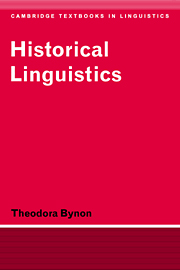Summary
Historical linguistics seeks to investigate and describe the way in which languages change or maintain their structure during the course of time; its domain therefore is language in its diachronic aspect. Descriptive linguistics on the other hand totally disregards time as a relevant factor in its investigations and attributes to the data a uniform status of simultaneity; its concern is therefore language in its synchronic aspect. It will thus be seen that it is not simply the greater or lesser extension in time of the data being investigated which constitutes the fundamental difference between synchronic and diachronic analysis, but rather the linguist's attitude towards the time dimension itself.
Justification for the claim to independent status of synchronic description derives essentially from the observation that the speakers for whom a particular language serves as a means of communication are in general quite unaware of its historical dimension. If, then, the linguist is to create a model of the code which the members of a speech community share and through which they communicate with one another, this must surely be equally independent of all historical considerations.
But that language does in fact change during the course of time soon becomes evident when documents written in the same language but at different periods in time are subjected to examination. And, once allowance has been made for those orthographic and stylistic conventions which are characteristic of languages in their written form, it may fairly be assumed that such texts are representative samples of the spoken language as it was when they were committed to writing, structured in accordance with the synchronic rules then operating.
Information
- Type
- Chapter
- Information
- Historical Linguistics , pp. 1 - 14Publisher: Cambridge University PressPrint publication year: 1977
